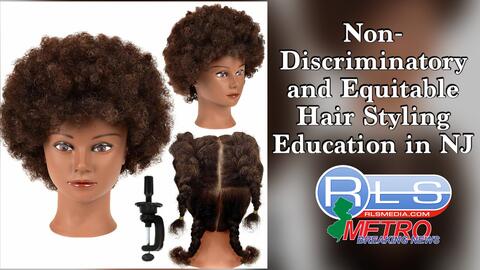By: Richard L. Smith
In a groundbreaking agreement, New Jersey has joined forces with the Gloucester County Vocational-Technical School District, setting a precedent for inclusive cosmetology education that ensures students are adept at styling Black and other textured hair.
The partnership is a significant step toward providing equitable hair styling services for individuals with diverse hair types.
Under the terms of the Assurance of Voluntary Compliance announced today, the school district responsible for Gloucester County Institute of Technology (GCIT) has pledged to "maintain a sufficient number of mannequins with all hair types and textures, including Black and other textured hair so that each student has the opportunity to practice skills on all types and textures of hair."
Specifically, GCIT has committed to having at least 20% of its mannequins featuring Black hair.
Furthermore, the agreement ensures that the Cosmetology Department staff at GCIT will instruct all students, regardless of their race or ethnicity, in the theory and practice of styling hair of all types and textures.
Students will also receive guidance on the Division on Civil Rights (DCR) recommendations concerning race discrimination in hairstyles.
This Assurance of Voluntary Compliance brings an end to an investigation prompted by allegations of race discrimination within GCIT's cosmetology program.
The investigation delved into claims that the Cosmetology Department did not mandate non-Black students to learn skills related to Black and textured hair, nor did it possess an adequate number of mannequins to facilitate styling practice on such hair types.
Attorney General Platkin stressed the importance of cosmetology programs in New Jersey, equipping students to handle diverse hair types confidently, saying, "New Jerseyans should be confident that cosmetology programs in our state are adequately preparing all students to be able to cut and style all hair types and textures."
This agreement, he noted, sets a vital standard for creating more inclusive programs that serve cosmetology patrons who have historically faced marginalization or denial of service.
Sundeep Iyer, Director of the Division on Civil Rights, emphasized the necessity of styling Black and textured hair as part of the core training provided by all cosmetology schools.
He noted that the agreement could serve as a model for cosmetology schools across the state, ensuring that graduates are equipped to serve a diverse clientele.
This significant agreement aligns with the goals of the Department of Law and Public Safety's Racial Justice Initiative, aimed at addressing historical racial inequities.
It also advances the principles of the Create a Respectful and Open Workplace for Natural Hair Act (CROWN Act), a state law enacted in 2019 that explicitly recognizes prohibited race discrimination under the New Jersey Law Against Discrimination, encompassing discrimination based on historically associated racial traits, including hair texture, type, and styles like braids, locks, and twists.

